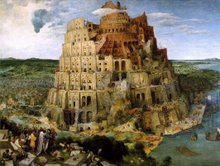
Micheal Jackson and a monkey - "Jeff Koons"
What would you say if I told you that there was an insidious dark ideal infecting the art culture, the very belief structure of which is paradoxical? It is a faith of non-belief and it is merely being accepted, not challenged, as the only system of intellectual thought. All else is dismissed as "
kitsch". And not surprisingly, this movement "appropriates" (bastardizes) all forms of "kitsch" for the purposes of pointing out its futility. The acolytes of this dogma tend, in the arts, to hide behind irony as a shield for a lack of quality, content, or emotive integrity. A prime example of such an "artist" is
Jeff Koons (above), who passes off other people's "craft" as his own, and whose only discernible product is shock value. - "He says with a sardonic grin."
"To choose doubt as a philosophy of life is akin to choosing immobility as a means of transportation." - Yann Martel,
The Life of PiWhat is this philosophy of doubt of which I speak? Why, it is nothing more than an abstract categorization called "Post-modernism": a single label within the structure of philosophical theory meant to categorize the idea of the negation of structure. (Sounds like a paradox, no?). One of the main premises of post-modern thought, and the one for which I have the most criticism is the idea that all experience, all life, everything is essentially meaningless. This stems from the deconstructive thought of
Heidegger , Kierkegaard, and
Derrida,further complicated by
Schroedinger and the
Heisenberg uncertainty principle.
However, I view uncertainty and probability as something separate from negation.
This
absurdist philosophy or rather, nihilism, is a
process and
not a
conclusion, just as deconstruction is a process and not a conclusion.
In the dialogue of painting one might see our contemporary era as a re-constructive era. Where the tenets of Derrida informed the deconstructive elements of post-modernism, the act of mimesis or the appropriation of “obsolete vernacular” is a sign of the discontents that our contemporary culture finds in the detritus of post-modern thought. Now we pick up the cogs and springs to reassemble them – to create order if only because we feel it is needed. We reclaim the mysterious origin of art – meaning. It’s interesting that we might confuse nostalgia with meaning, but does that make it any less potent, universal, or reflective of life? For that’s what art does… reflect life.
Obviously this is a weighty topic which could not simply be condensed to one listing... So,
this diatribe will be continued in later postings, so hold tight and please feel free to let me know your responses etc...
Richard T Scott
www.memoreejoelle.org
